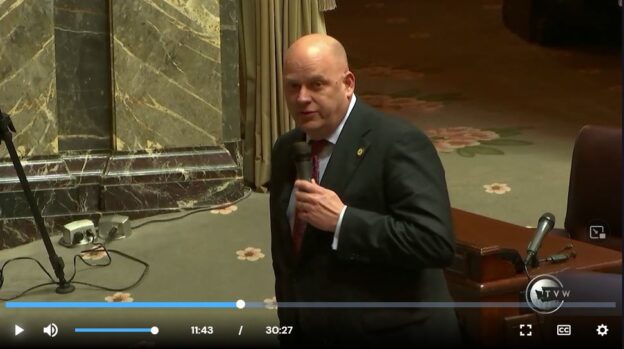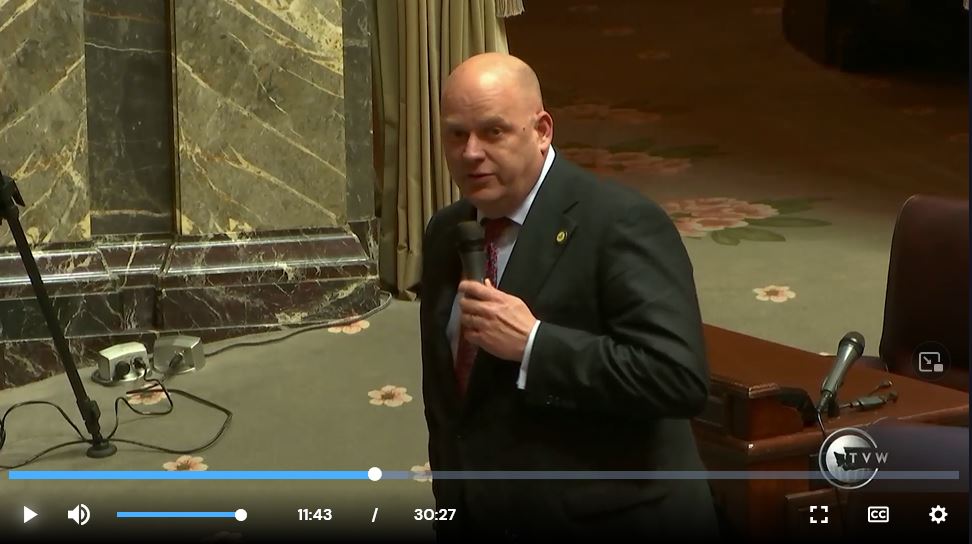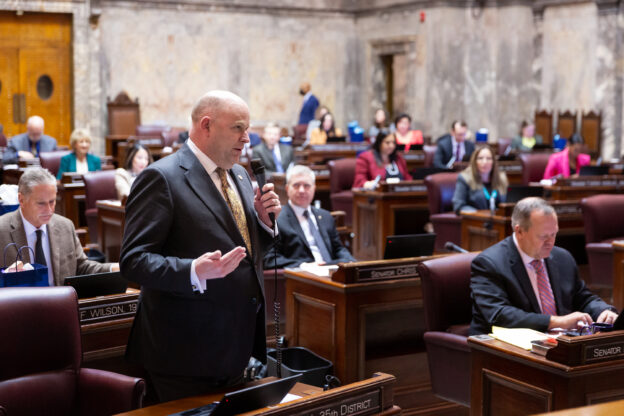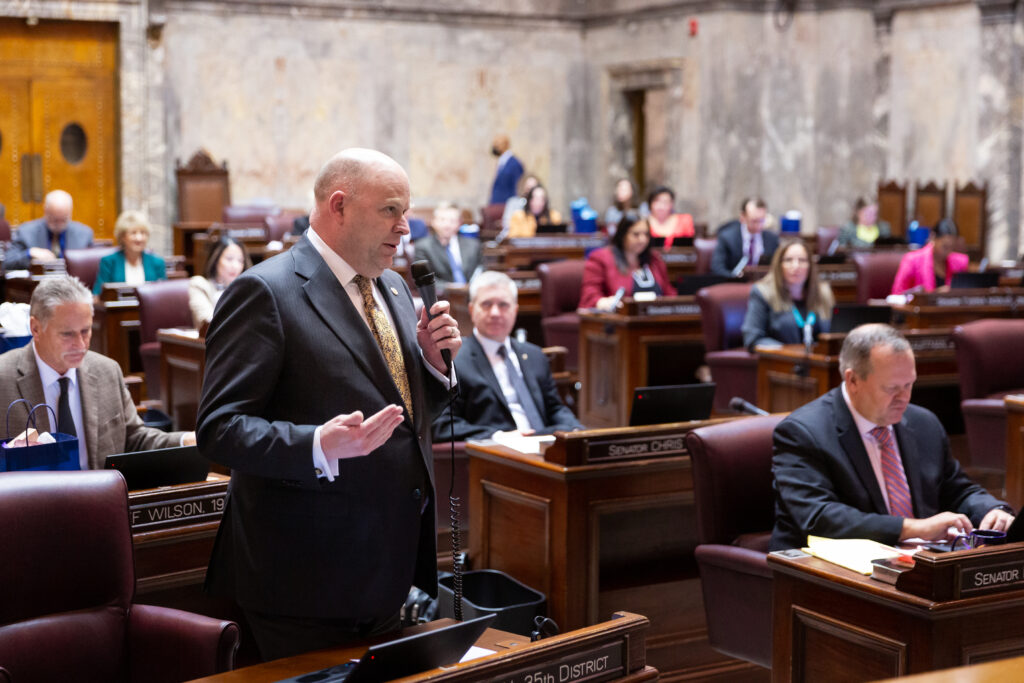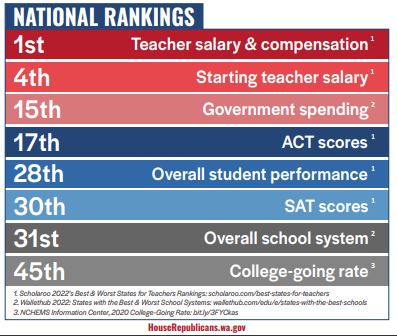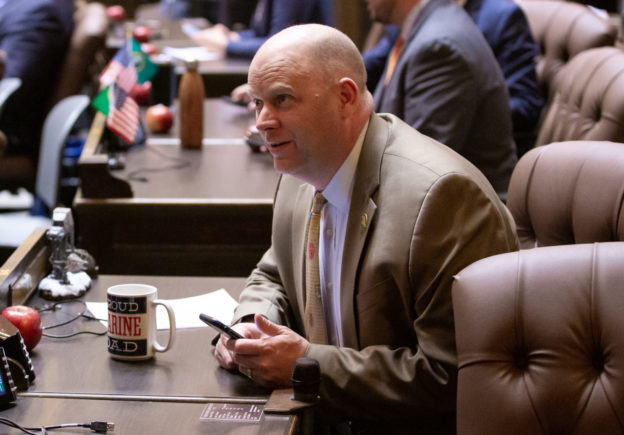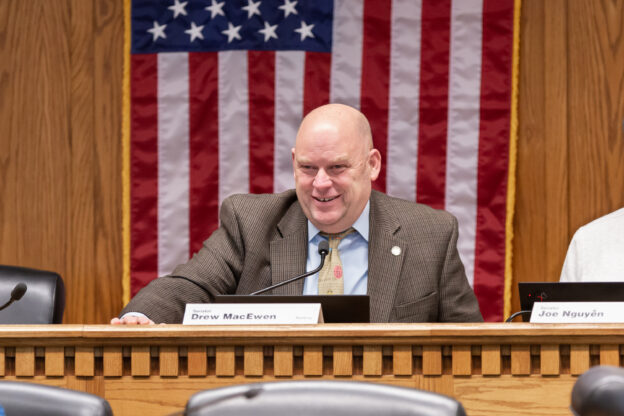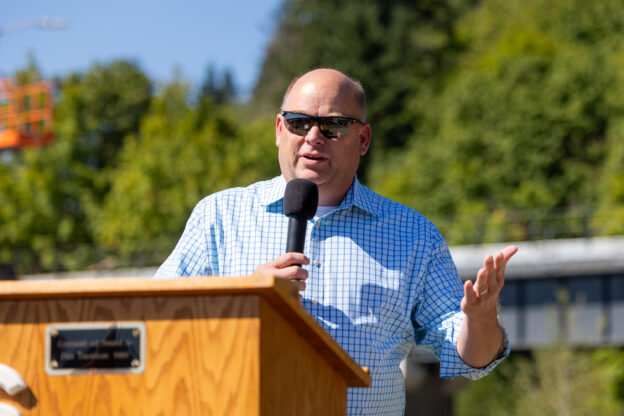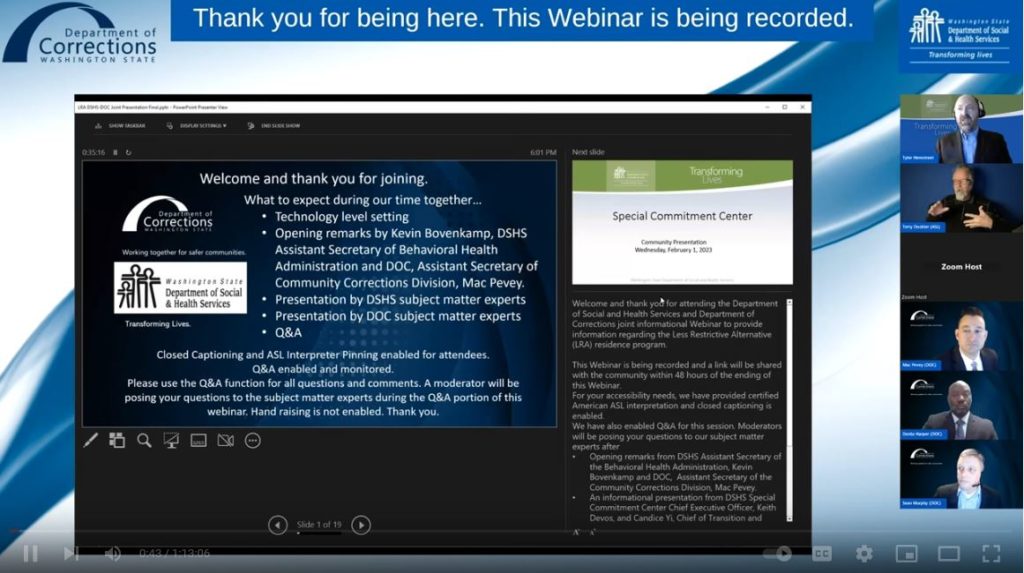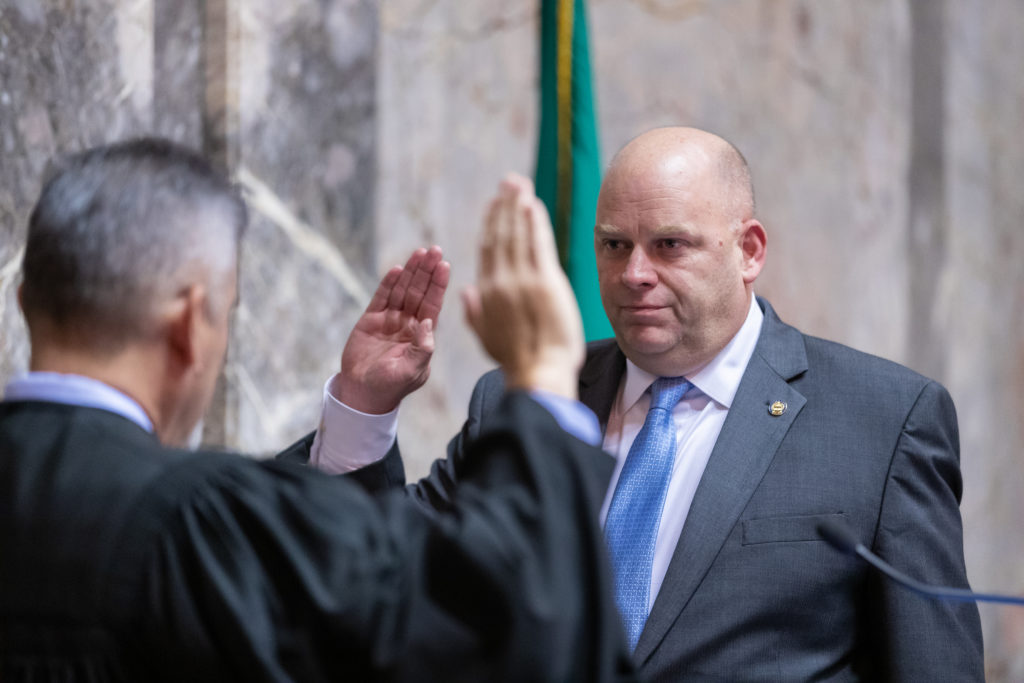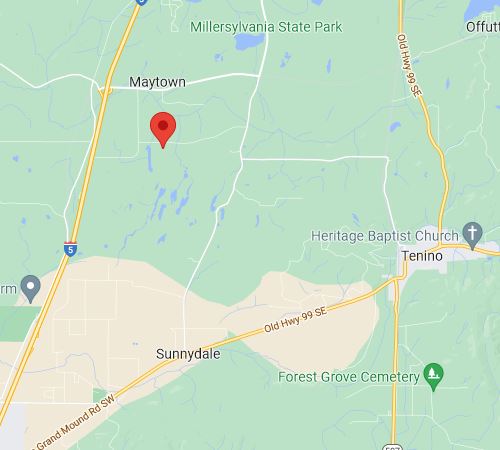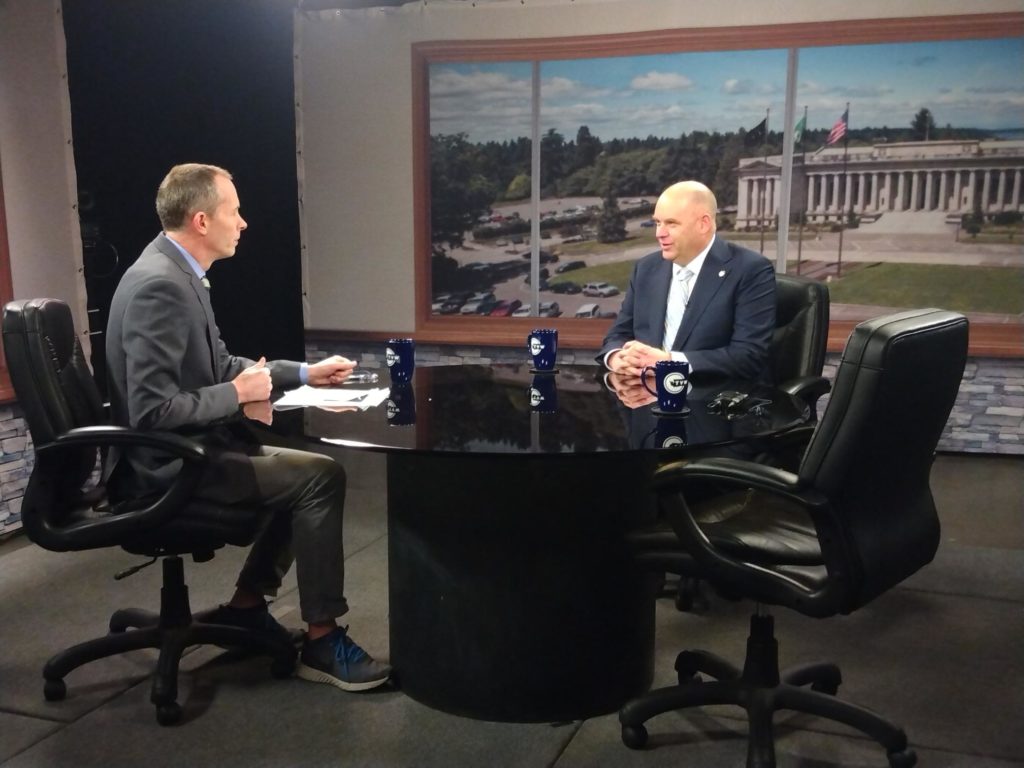Navy veteran and submariner MacEwen presents Navy Day resolution
OLYMPIA – During ceremonies on the Senate floor Thursday, Navy veteran and submariner Sen. Drew MacEwen presented the annual Navy Day resolution.
Senate Resolution 8628 recognizes the historic importance of the U.S. Navy in protecting our shores and the role of Puget Sound naval installations in our national defense. The resolution has special meaning for MacEwen, R-Shelton, who served six years in the branch, including five patrols with the Navy’s submarine force on the U.S.S. Nevada. He developed his affinity for the 35th Legislative District while stationed at Naval Base Kitsap.
“Today I had the honor on the Senate floor to recognize the U.S. Navy’s many contributions to our great state,” MacEwen said. “The Navy has a storied history in Washington and is an integral part of the fabric of our state.
“As one of the most trade dependent states in our nation, Washington needs to remember that sea supremacy is vital not only to our national security but also our trade. We cannot take that for granted, and must continue to stand alert in today’s ever-changing world. Along with all of my fellow sailors past and present, I take great pride in our Navy and its contributions to our state. “
The resolution notes the Navy’s enormous economic impact on Washington state, home to more than 11,000 Navy service members. The Navy generates more than $11 billion in economic activity within Washington, provides more than 79,000 military and civilian jobs, and generates more than $303 million in state and local taxes. The resolution expresses “unwavering gratitude and appreciation for the United States Navy and the prosperity and protection it has provided to Washington.”
Full text of Senate Resolution 8628:
WHEREAS, The United States Navy was officially created by Congress in April, 1798, and has its earliest roots in General George Washington’s Continental Navy, which he formed in 1775 to defend the American colonies from British attack; and
WHEREAS, The United States Navy maintains, trains, and equips combat-ready forces for the purpose of deterring aggression toward the United States and maintaining freedom on the seas; and
WHEREAS, The United States Navy is also responsible for the seaborne support of the other branches of the United States military; and
WHEREAS, The United States Navy has seven active fleets currently in service, with 11 aircraft carriers, 92 cruisers and destroyers, and 59 small-surface combatants and combat logistics ships; and
WHEREAS, The United States Navy’s submarine fleet consists of 50 fast-attack submarines, 14 ballistic-missile submarines, and four cruise-missile submarines, all working in close collaboration with navies of American allies; and
WHEREAS, All submariners in the United States Navy have volunteered for their positions and take enormous pride in the level of sacrifice and difficulty of their unique duty and service in seas around the world; and
WHEREAS, Six United States presidents served in the United States Navy in World War II alone before they led our nation, including John F. Kennedy, Lyndon B. Johnson, Richard Nixon, Gerald Ford, Jimmy Carter, and George H.W. Bush; and
WHEREAS, The United States Navy maintains a strong presence in Washington state through Naval Base Kitsap, Naval Air Station Whidbey Island, and Naval Station Everett; and
WHEREAS, Naval Base Kitsap is the third-largest United States Navy installation in the United States, and is home to a diverse naval force, including all types of submarines, two Nimitz-class aircraft carriers, Puget Sound Naval Shipyard, and the Manchester Fuel Depot; and
WHEREAS, A naval station was established in Bremerton, Washington, in 1891, becoming the 179-acre Puget Sound Naval Shipyard after World War II, which has been responsible for construction, modernization, conversion, maintenance, and nuclear refueling of Navy vessels; and
WHEREAS, Washington is home to more than 11,000 Navy service members and generates more than $11 billion in economic activity, provides more than 79,000 military and civilian jobs, and more than $303 million in state and local taxes; and
WHEREAS, Former Governor Dan Evans served in the United States Navy during World War II from 1943 to 1946; and
WHEREAS, Many members and staff of the Washington State Legislature have served in the United States Navy and many Navy veterans have gone on to serve their country in political office around the country; and
WHEREAS, The United States Navy has beaten the United States Army in more than half of the 123 Army-Navy football games and has the longer winning streak of the two teams;
NOW, THEREFORE, BE IT RESOLVED, That on behalf of the people of Washington and the more than 64,000 Navy service members and families who live in our communities, the Senate express its unwavering gratitude and appreciation for the United States Navy and the prosperity and protection it has provided to Washington.











